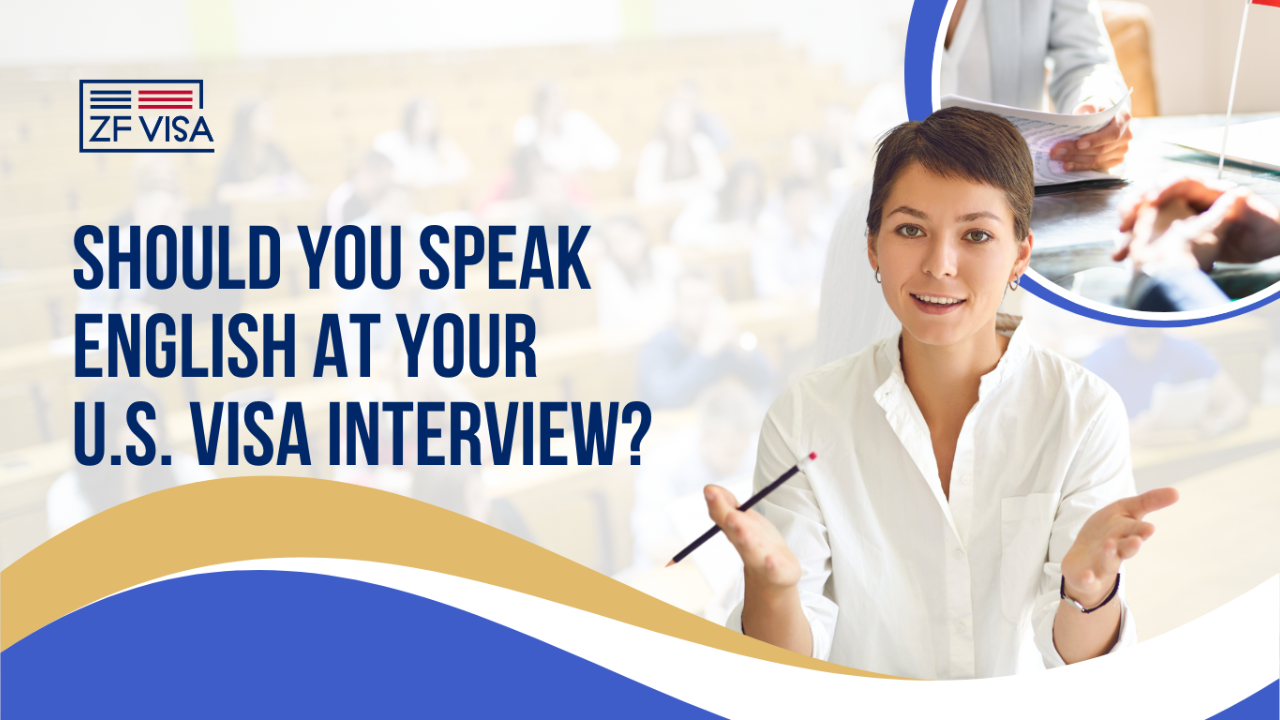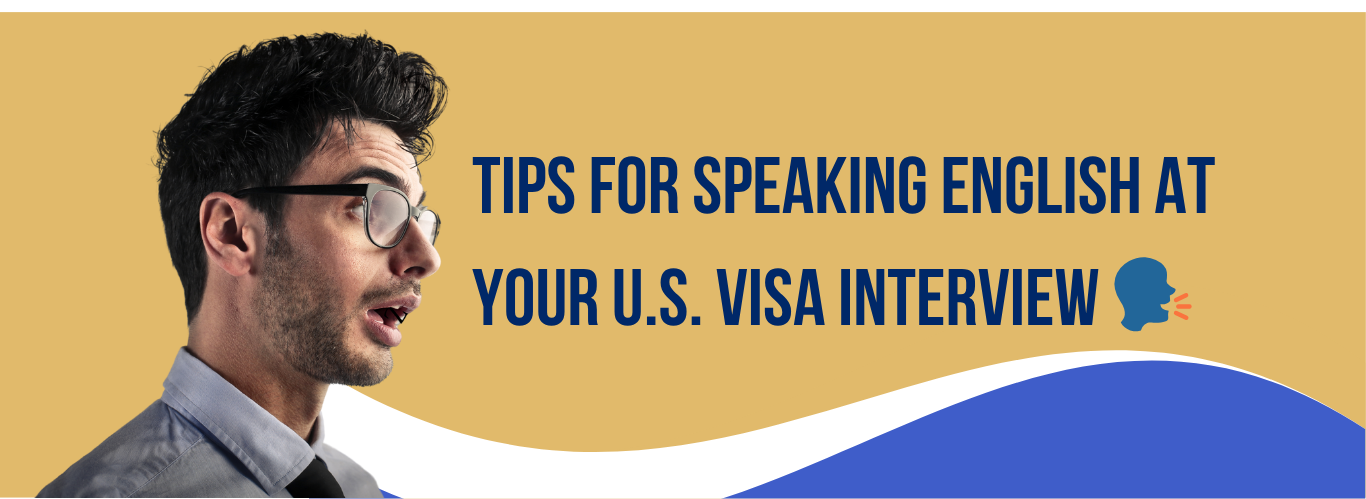
Should You Speak English at Your U.S. Visa Interview?
Written by Travis and Mandy Feuerbacher, Former Visa Officers & Immigration Attorneys
Preparing for your U.S. visa interview can be stressful, especially if you're unsure about whether to speak English or stick to your native language. While there’s no official rule, how you choose to communicate can affect the flow of the interview. In this blog, we’ll answer the big question: should you speak English at your U.S. visa interview? and share tips directly from former visa officers.
Does Speaking English Impact Your Interview? 🤔
Can your choice of language impact your visa approval? For B1/B2 Visitor Visas, there is no expectation that you can speak English. In fact, Visa Officers are trained to speak local languages, so you should be able to communicate during your interview in your native language, assuming you apply in your own country or region. Visa officers will evaluate your eligibility based on your responses to their questions, your overall situation, and sometimes key documents, but not on your English proficiency.
For other visas, however, you may need to speak English to qualify for your visa. A good example is the F-1 Student Visa. During the F-1 Student Visa interview, your Visa Officer will evaluate not only whether you qualify for a visa, but also whether your English proficiency is sufficient for you to understand what is taught in class. You should plan to speak English throughout the student visa interview without reverting back to your native language if possible.
📝 The Key Point: Communicating in English, even if not required or expected for your specific visa, can leave a good first impression. Even if your English is not strong, practicing some basic phrases in English is a good idea!

If you’re considering speaking English at your visa interview, here are some tips to make you feel more confident:
- It’s okay to make mistakes: The goal is clear communication, not perfection. Visa officers understand that English is not your first language.
- Keep your answers simple: You don’t need to speak in complex sentences. Aim for clarity in your responses, not simply more words.
- Practice beforehand: Review common questions and practice answering them in English. Even practicing a few key phrases can help ease your nerves.
- Don’t be afraid to switch languages: If you feel like you’re not expressing yourself well in English, you can ask the officer to continue the interview in your native language.
When Should You Stick to Your Native Language? 🌍
If you’re applying for a B1/B2 Visitor Visa and speaking English isn’t an option for you, don’t worry! It’s important to stay true to yourself and speak in a language you’re comfortable with.
- Native language is accepted: Most U.S. embassies allow you to speak your native language. Just be aware that some interviews might require a translator if the officer doesn't understand your language.
- No need to stress: You don’t have to speak English just to impress the officer. The visa decision will be based on your answers, documents, and situation - language is a secondary factor.
When Should You Speak English? 🌍
If you’re applying for an F-1 Student Visa, you should plan to speak English. Remember that your Visa Officer will pay close attention to your English proficiency to determine if you’re likely to understand what is taught in class.
- English Language Programs: Even if you’re planning to study English in the United States, Visa Officers may expect that you have at least some proficiency in English, so plan to speak English in at least part of the interview.
- Don’t overthink it: Your officer does not expect you to speak perfect, flawless English. Focus on explaining your plans and situation clearly, but don’t aim for perfect, complex sentences.

- Should I speak English at my U.S. visa interview?
if you’re applying for a student visa, then yes! For B1/B2 Visitor Visas, there’s generally no expectation that you can speak English, though you might consider speaking in English if you’re comfortable, or if you don’t speak the local language or you’re applying outside of your home country or region. Otherwise, speaking your native language is totally fine. - Can speaking English improve my chances of visa approval?
If you’re applying for a student visa, not speaking English can lead to a denial. For B1/B2 Visitor Visas English abilities generally won’t affect your chance of approval. Your visa decision is based on your eligibility and the interview responses, not your language skills. - Can I use a translator during my interview?
If you’re more comfortable in your native language, you can ask for a translator. Be sure to check the local regulations and policies on the website of the Embassy or Consulate where you scheduled your interview. - Do I have to speak perfect English?
No! The goal is communication, not perfection. - How do I know when to speak English and when to switch to my native language?
If you’re applying for a student visa, then you should speak English. If you’re applying for a B1/B2 Visitor Visa and you’re confident in English, speak it! If not, it’s okay to let the officer know and continue in your native language.
Final Thoughts: Speak with Confidence and Be Yourself! ✨
In the end, the most important thing is confidence. Whether you speak English or your native language, your responses and the information you provide matter most. Speak clearly, be honest, and show that you’re well-prepared for the interview, regardless of the language you choose.
📝 Quick Summary:
- ✅ Speak English if you are seeking a student visa (e.g., F-1).
- ✅ If you’re applying for a B1/B2 Visitor Visa, speak English if you feel comfortable, but remember that it’s not required.
- ✅ Consider practicing basic English phrases, but don’t worry about perfection.
- ✅ Confidence is key! Don’t stress over language; focus on your answers.
Take the Next Step Towards Visa Approval
🎥 Watch: Our expert video on speaking English at your U.S. visa interview.
📩 Download: Your free step-by-step visa preparation guides, trusted by thousands of successful applicants. (Free F-1 Visa Guide & Free B-1/B2 Visa Guide)
🧳 Prepare: Enroll in our comprehensive visa interview course to boost your confidence and readiness.
Your approval isn’t based on luck - it’s based on preparation. Let’s make it happen!
Legal Note: The information provided does not constitute legal advice or a guarantee of visa approval. For specific legal guidance, contact ZF Visa & Immigration at [email protected].
Stay connected with news and updates!
Join our mailing list to receive the latest news and updates from our team.
We hate SPAM. We will never sell your information, for any reason.


